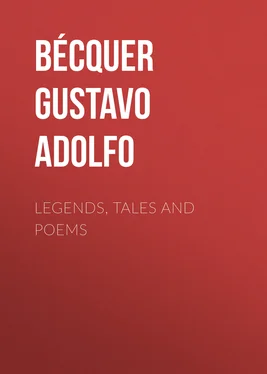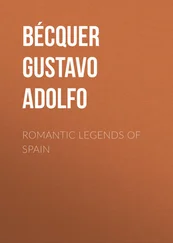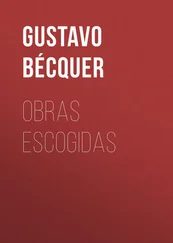Gustavo Bécquer - Legends, Tales and Poems
Здесь есть возможность читать онлайн «Gustavo Bécquer - Legends, Tales and Poems» — ознакомительный отрывок электронной книги совершенно бесплатно, а после прочтения отрывка купить полную версию. В некоторых случаях можно слушать аудио, скачать через торрент в формате fb2 и присутствует краткое содержание. Жанр: foreign_prose, literature_19, foreign_antique, на английском языке. Описание произведения, (предисловие) а так же отзывы посетителей доступны на портале библиотеки ЛибКат.
- Название:Legends, Tales and Poems
- Автор:
- Жанр:
- Год:неизвестен
- ISBN:нет данных
- Рейтинг книги:5 / 5. Голосов: 1
-
Избранное:Добавить в избранное
- Отзывы:
-
Ваша оценка:
- 100
- 1
- 2
- 3
- 4
- 5
Legends, Tales and Poems: краткое содержание, описание и аннотация
Предлагаем к чтению аннотацию, описание, краткое содержание или предисловие (зависит от того, что написал сам автор книги «Legends, Tales and Poems»). Если вы не нашли необходимую информацию о книге — напишите в комментариях, мы постараемся отыскать её.
Legends, Tales and Poems — читать онлайн ознакомительный отрывок
Ниже представлен текст книги, разбитый по страницам. Система сохранения места последней прочитанной страницы, позволяет с удобством читать онлайн бесплатно книгу «Legends, Tales and Poems», без необходимости каждый раз заново искать на чём Вы остановились. Поставьте закладку, и сможете в любой момент перейти на страницу, на которой закончили чтение.
Интервал:
Закладка:
Zorilla has been said to be Becquer's most immediate precursor, in that he possesses the same instinct for the mysterious. But, as Blanco Garcia observes, "Becquer is less ardent than Zorilla, and preferred the strange traditions in which some unknown supernatural power hovers to those others, more probable, in which only human passions with their caprices and outbursts are involved."[1] Correa says of his legends that they "can compete with the tales of Hoffmann and of Grimm, and with the ballads of Rückert and of Uhland," and that "however fantastic they may be, however imaginary they may appear, they always contain such a foundation of truth, a thought so real, that in the midst of their extraordinary form and contexture a fact appears spontaneously to have taken place or to be able to take place without the slightest difficulty, if you but analyze the situation of the personages, the time in which they live, or the circumstances that surround them."[2]
[Footnote 1: La Literatura Española en el Siglo XIX , Madrid, 1891, vol. II, p. 275.]
[Footnote 2: Correa, op. cit. , p. xxx.]
The subtle charm of such legends as Los Ojos Verdes , La Corza Blanca , Maese Pérez el Organista , etc., full of local color as they are, and of an atmosphere of old Spain, is hard to describe, but none the less real. One is caught by the music of the prose at the first lines, enraptured by the weird charm of the story, and held in breathless interest until the last words die away. If Becquer's phrase is not always classic, it is, on the other hand, vigorous and picturesque; and when one reflects upon the difficult conditions under which his writings were produced, in the confusion of the printing-office, or hurriedly in a miserable attic to procure food for the immediate necessities of his little family, and when one likewise recalls the fact that they were published in final book form only after the author's death, and without retouching, the wonder grows that they are written in a style so pleasing and so free from harshness.
Becquer's prose is doubtless at its best in his letters entitled Desde mi Celda , written, as has been said, from the monastery of Veruela, in 1864. Read his description of his journey to the ancient Aragonese town of Tarazona, picturesquely situated on the River Queiles, of his mule trip over the glorious Moncayo, of the peacefulness and quiet of the old fortified monastery of Veruela, and you will surely feel inspired to follow him in his wanderings. Writing of his life in the seclusion of Veruela, Becquer says: "Every afternoon, as the sun is about to set, I sally forth upon the road that runs in front of the monastery doors to wait for the postman, who brings me the Madrid newspapers. In front of the archway that gives entrance to the first inclosure of the abbey stretches a long avenue of poplars so tall that when their branches are stirred by the evening breeze their summits touch and form an immense arch of verdure. On both sides of the road, leaping and tumbling with a pleasant murmur among the twisted roots of the trees, run two rivulets of crystalline transparent water, as cold as the blade of a sword and as gleaming as its edge. The ground, over which float the shadows of the poplars, mottled with restless spots of light, is covered at intervals with the thickest and finest of grass, in which grow so many white daisies that they look at first sight like that rain of petals with which the fruit-trees carpet the ground on warm April days. On the banks of the stream, amid the brambles and the reeds, grow wild violets, which, though well-nigh hidden amongst their creeping leaves, proclaim themselves afar by their penetrating perfume. And finally, also near the water and forming as it were a second boundary, can be seen between the poplar trunks a double row of stocky walnut-trees with dark, round, compact tops." About half way down the avenue stands a marble cross, which, from its color, is known in the vicinity as the Black Cross of Veruela. "Nothing is more somberly beautiful than this spot. At one end of the road the view is closed by the monastery, with its pointed arches, its peaked towers, and its imposing battlemented walls; on the other, the ruins of a little hermitage rise, at the foot of a hillock bestrewn with blooming thyme and rosemary. There, seated at the foot of the cross, and holding in my hands a book that I scarcely ever read and often leave forgotten on the steps of the cross, I linger for one, two, and sometimes even four hours waiting for the papers." At last the post arrives, and the Contemporáneo is in his hands. "As I was present at its birth, and as since its birth I have lived its feverish and impassioned life, El Contemporáneo is not for me a common newspaper like the rest, but its columns are yourselves, my friends, my companions in hope or disappointment, in failure or triumph, in joy or bitterness. The first impression that I feel upon receiving it, then, is one of joy, like that experienced upon opening a letter on whose envelope we recognize a dear familiar handwriting, or when in a foreign land we grasp the hand of a compatriot and hear our native tongue again. The peculiar odor of the damp paper and the printer's ink, that characteristic odor which for a moment obscures the perfume of the flowers that one breathes here on every hand, seems to strike the olfactory memory, a strange and keen memory that unquestionably exists, and it brings back to me a portion of my former life,—that restlessness, that activity, that feverish productiveness of journalism. I recall the constant pounding and creaking of the presses that multiply by thousands the words that we have just written, and that have come all palpitating from our pens. I recall the strain of the last hours of publication, when night is almost over and copy scarce. I recall, in short, those times when day has surprised us correcting an article or writing a last notice when we paid not the slightest attention to the poetic beauties of the dawn. In Madrid, and for us in particular, the sun neither rises nor sets: we put out or light the lights, and that is the only reason we notice it."
At last he opens the sheet. The news of the clubs or the Cortes absorbs him until the failing light of the setting sun warns him that, though he has read but the first columns, it is time to go. "The shadows of the mountains fall rapidly, and spread over the plain. The moon begins to appear in the east like a silver circle gleaming through the sky, and the avenue of poplars is wrapped in the uncertain dusk of twilight.... The monastery bell, the only one that still hangs in its ruined Byzantine tower, begins to call to prayers, and one near and one afar, some with sharp metallic notes, and some with solemn, muffled tones, the other bells of the hillside towns reply.... It seems like a harmony that falls from heaven and rises at the same time from the earth, becomes confounded, and floats in space, intermingling with the fading sounds of the dying day and the first sighs of the newborn night.
"And now all is silenced,—Madrid, political interests, ardent struggles, human miseries, passions, disappointments, desires, all is hushed in that divine music. My soul is now as serene as deep and silent water. A faith in something greater, in a future though unknown destiny, beyond this life, a faith in eternity,—in short, an all-absorbing larger aspiration, overwhelms that petty faith which we might term personal, that faith in the morrow, that sort of goad that spurs on irresolute minds, and that is so needful if one must struggle and exist and accomplish something in this world."[1]
[Footnote 1: Obras , vol. II, pp. 222–229.]
This graceful musing, full in the original of those rich harmonies that only the Spanish language can express, will serve sufficiently to give an impression of the series as a whole. The broad but fervent faith expressed in the last lines indicates a deeply religious and somewhat mystical nature. This characteristic of Becquer may be noticed frequently in his writings and no one who reads his works attentively can call him elitist, as have some of his calumniators.
Читать дальшеИнтервал:
Закладка:
Похожие книги на «Legends, Tales and Poems»
Представляем Вашему вниманию похожие книги на «Legends, Tales and Poems» списком для выбора. Мы отобрали схожую по названию и смыслу литературу в надежде предоставить читателям больше вариантов отыскать новые, интересные, ещё непрочитанные произведения.
Обсуждение, отзывы о книге «Legends, Tales and Poems» и просто собственные мнения читателей. Оставьте ваши комментарии, напишите, что Вы думаете о произведении, его смысле или главных героях. Укажите что конкретно понравилось, а что нет, и почему Вы так считаете.












